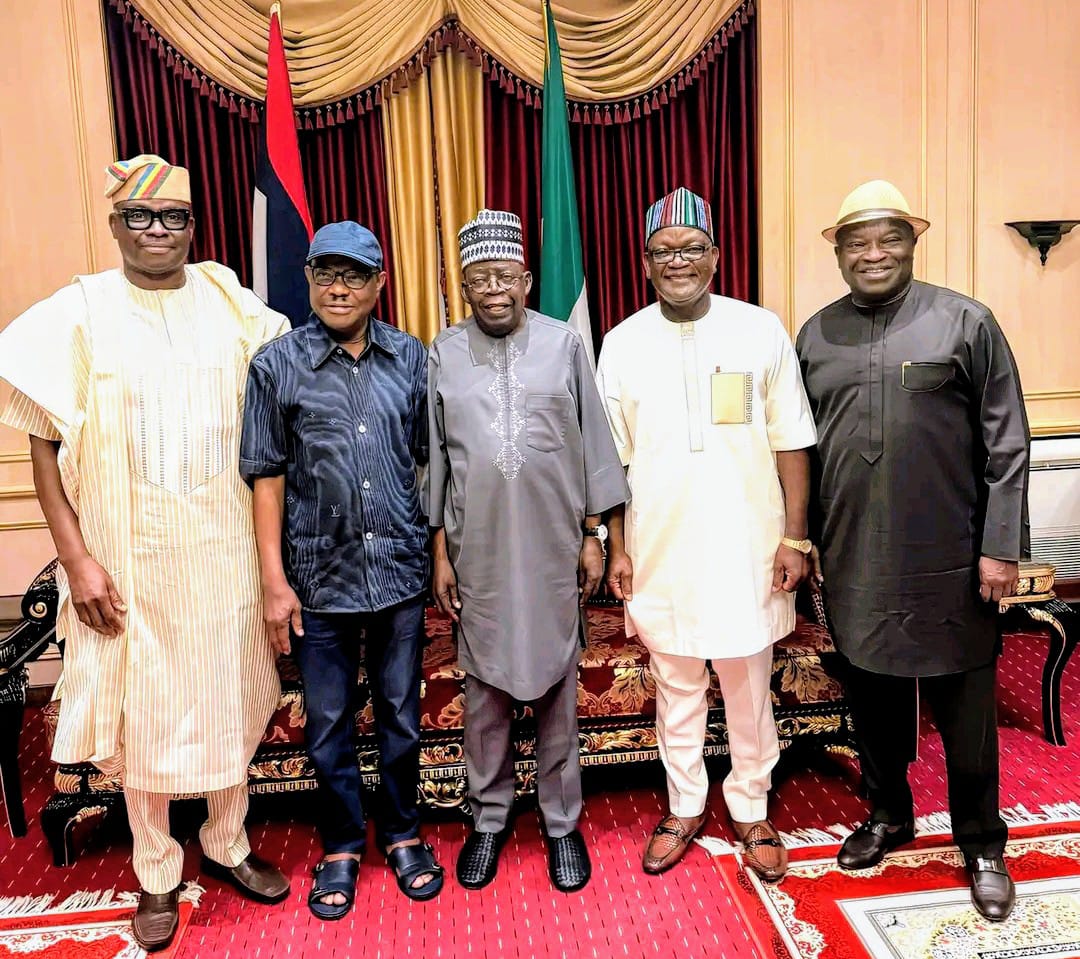President Bola Ahmed Tinubu’s recent closed-door meeting with a group of former governors from the opposition Peoples Democratic Party (PDP) has sent ripples through the fabrics of Nigeria’s political landscape.
While publicly billed as a private meeting, political analysts and insiders alike have interpreted the gathering as far more than a casual evening affair. In a country where dinner meetings have historically served as preludes to significant political realignments, this particular rendezvous has all the trappings of a quiet storm; subtle on the surface but charged with potent undercurrents.
This analysis explores the implications of this meeting for the ruling All Progressives Congress (APC), the embattled PDP, and the broader trajectory of Nigeria’s democratic process.
The meeting was attended by several prominent former PDP governors, many of whom still wield considerable political influence in their respective states and zones. These include: former Governor of Ekiti State, Ayodele Fayose, FCT Minister, Nyesom Wike, and former governors of Benue and Abia States, Samuel Ortom and Okezie Ikpeazu respectively.
Though, details of the meeting remains undisclosed, the inclusion of multiple geo-political zones hints at more strategic intentions. Notably, many of the attendees are no longer active players in the frontline of the PDP’s decision-making machinery but remain respected “godfathers” and opinion shapers within their spheres of influence.
It’s no longer news that the PDP has remained enmeshed and entangled by its own internal discord, particularly since the 2023 general elections. Factionalism, leadership crises, and a lack of clear direction have left the party vulnerable.
Tinubu’s engagement with these former governors however comes at a time when the PDP’s political machinery is weakened, and public confidence in the party’s ability to mount a credible opposition come 2027 is dwindling considering the recent gale of defections by its serving national Assembly members and other prominent leaders.
Conversely, Tinubu has been working to consolidate his base and extend the reach of the APC across former PDP strongholds. The meeting, therefore, appears to be part of a larger political chess game suffice to be called a subtle invitation to either defect, collaborate, or become neutral allies in the larger national agenda ahead of 2027.
Sources in Abuja suggest the meeting was not merely a goodwill gesture but an opportunity for political alignment and soft recruitment, preempting opposition coalition building, and attempt to legitimize his pan-Nigerian posture.
Meeting with prominent figures from diverse regions at this period in time also reinforces Tinubu’s image as a national leader willing to engage across party lines; a critical narrative given persistent criticisms of regional favoritism.
The APC has however, on its part remained tactfully silent or dismissive of any political undertones, portraying the meeting as an informal courtesy meeting. However, within the PDP, reactions range from concern to confusion. While some party members have downplayed the significance of the meeting, others view it as a betrayal or at least an indication of shifting loyalties for personal political gains.
Party loyalists fear that such interactions could further destabilize the PDP’s already fragile unity. With trust in short supply, even symbolic gestures like this meeting can ignite political suspicion and infighting that may culminate into disaffection.
The implications of this meeting could unfold in several ways bearing in mind that 2027 lurks around the corner and politics already taking the center stage of national discuss despite being only two years into the administration of President Bola Tinubu.
For PDP, the meeting underpins the urgency for the party to resolve its internal crisis, re-engage elder statesmen, and rebuild a clear ideological and strategic framework to maintain its relevance.
While for APC, Tinubu’s strategy may yield gains in softening the opposition, expand influence, and absorb key players without the messiness of open defection. It’s classic Tinubu; build bridges where others see barriers. The job is that simple.
For Nigerian Politics however, the meeting is a reminder of how fluid Nigeria’s political allegiances are. Parties are increasingly seen as mere platforms, while personal networks and access to power dictate loyalty. It also raises questions about the ideological hollowness of Nigerian politics, where the same individuals oscillate between parties based on opportunity rather than principle.
President Tinubu’s meeting with former PDP governors may have appeared as a benign courtesy call, but its undertones speak volumes. In Nigeria’s political theatre, where optics and timing often eclipse formal declarations, such events are rarely accidental.
The real storm is not the meeting itself, but the quiet realignments it foreshadows, a simmering reshuffle of loyalties, strategies, and narratives that could reshape the political landscape ahead of 2027.
Whether this becomes a masterstroke for Tinubu or a missed opportunity for the PDP remains to be seen but one thing is certain: in the banquet of Nigerian politics, every plate served holds a story, and every dinner can birth a political exodus.

